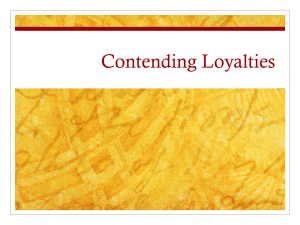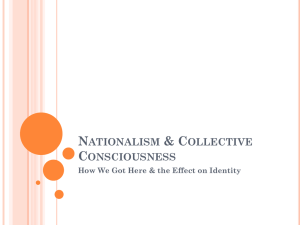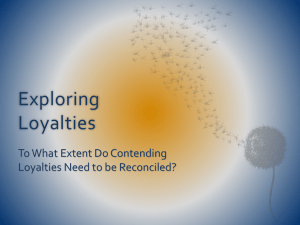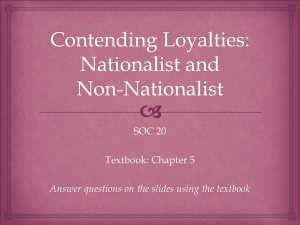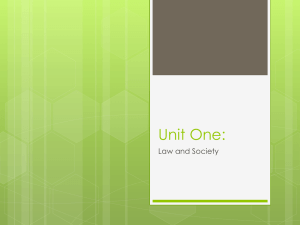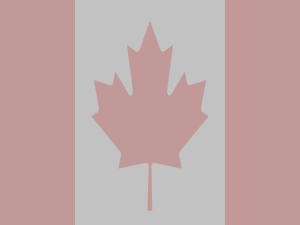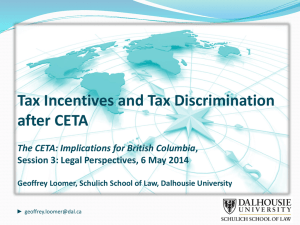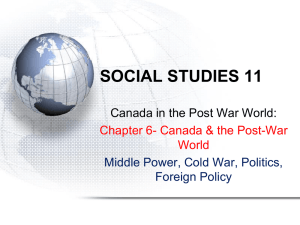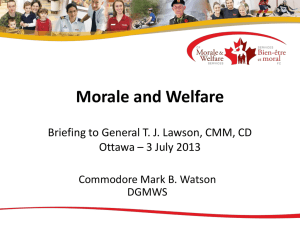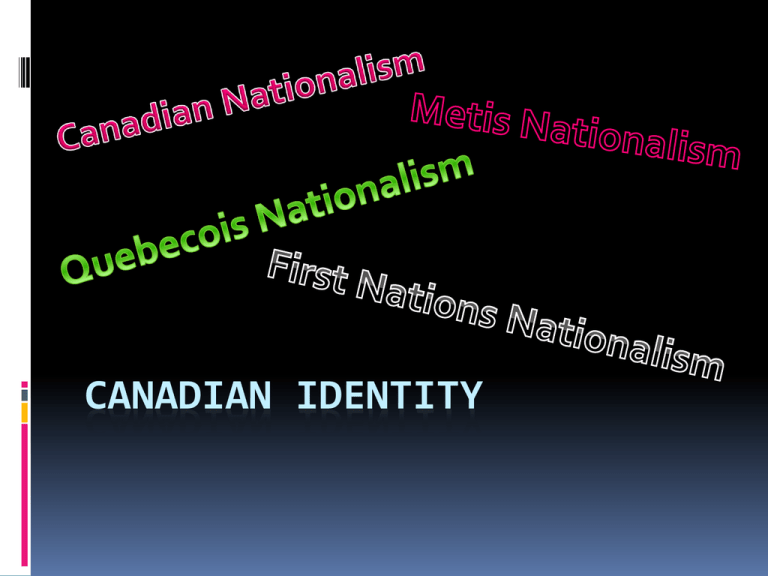
CANADIAN IDENTITY
Canadian Identity and
Nationalism
Canadian identity has historically, been very
hard to define.
If you ask “Us” what makes us Canadian,
most Canadians will say because I am
Canadian… or say, I am not America.
We are good at telling people what Canadians
“are not”, but we are not good at defining our
identity.
“I am Canadian”
The Railway and Canadian
National Identity
Many people died to make the CPR.
Most were immigrants and there were no
labor laws back then, so you can imagine the
working conditions.
How is the CPR a Canadian symbol?
Is it a “Canadian” symbol if it was built on the
backs of immigrants?
“The Canadian Railroad Trilogy” p. 76
Canadian Heritage Moment
Canadian Nationalism
Much of Canada’s history has been framed by
being one of Britain’s colonies.
Beyond the CPR, Vimy Ridge, the
Conscription crises and the Canadian Charter
of Rights and Freedoms are also pivotal
events in the minds of Canadians as defining
“our” coming of age.
Vimy Ridge
Pierre Trudeau- The Greatest Canadian
How has Canadian nationalism
changed?
“Our” nationalism used to be framed by our
the country’s British history.
However, it is now recognized that there are
many other groups of people that helped
create this country, both before and since
confederation.
Metis and First Nations
Nationalism
The White Paper
This was a proposal by PM Trudeau and his
Minister Jean Chretien to create a “just
society”. It called for the end of treaty rights,
reserves, and resource rights.
This would make aboriginal peoples have the
same status and rights as other people.
How do you think the First Nations peoples
reacted to this?
Métis and First Nations
Nationalism
They were outraged.
The First Nations peoples wanted to maintain
their equal, but different status, and wanted
to be able to seek self-determination and
self-governance.
As a result, changes were made and
ultimately resulted in First Nations and Métis
peoples being recognized as a distinct
collective of people in the Canadian Charter
of Rights and Freedoms.
Quebecois Nationalism
After years of wars between the French and
English, the English ultimately won the “rights”
to British North America, or Canada.
Up to that point, the dominant culture in
Quebec had been French.
Since then, Quebec has fought to maintain
their Francophone culture in a dominantly
Anglophone nation.
As a group, Francophones are another
collective in Canadian society that are
recognized as distinct in the Canadian Charter
of Rights and Freedoms.
What are competing (contending)
nationalist loyalties?
How do you decide where your loyalties lie?
There are often different celebrations for
different cultures. How do those celebrations
work within the ideas of nationalism?
National Aboriginal Day parade
Fete National parade
Chinese New Year parade
Edmonton Caribbean Arts Festival parade
All of these are celebrated in Canada, but are
they Canadian?
Cultural Pluralism
Cultural pluralism people from many nations living together.
Respect for cultural differences
Ethnic, linguistic, and religious groups live together in
harmony
Canada is a multicultural nation and
sometimes this combination of cultures leads
to conflict of loyalty.
American Nationalism
Unlike Canada, the USA seems to have little
trouble defining its nationalism
The USA was born out of a revolution against
British control
Unlike Canada, the United States was born
with a Declaration of Independence and a
Constitution
As well, unlike the multicultural nature of
Canada, the United States is understood to
be a Melting Pot
American Nationalism
Although the United States is a Melting Pot
and expects a certain amount of assimilation
to sustain their nationalism, it does not mean
that there are not conflicting ideas.
Civil War: 1861-1865
Slavery divided the North and South and resulted
in years of war and death
There are still lingering tensions today
America Dream
The idea that if you come to America, anyone can
make it
Competing Nationalist
Loyalties
When immigrants come to this country they
are have a right to maintain their culture and
beliefs.
Canada makes this work through
ACCOMMODATION
Canadian public institutions adapt to the religious and
cultural practices of minorities.
Ex. Sikhs wearing turbans in the RCMP
Ex. Wearing a hijab in sports
July 1 in Newfoundland- bloodiest day in Newfoundland
history (WWI)
Quebecois loyalties
There has long been conflict between French
and English in Canada
In 1995 there was a referendum for Quebec to
decide whether or not they should separate
from the country
50.52% decided they should stay
In 2006 that number rose to 58%
CBC News in Review- The Referendum
Of course there are two sides to every story
Sovereigntists support separation because they want
Quebec to be an independent nation (sovereign)
Federalists want Quebec to remain a part of the
Canadian confederation.
First Nations Contending
Loyalties
Although the Canadian government currently
has a policy of accommodation, it has not
always been that way
Previously, the government tried to
ASSIMILATE cultures, especially the First
Nations peoples.
They used various methods; most notably
residential schools. They also used the
reserve system to SEGREGATE the First
Nations population.
First Nations Contending
Loyalties
In 1990, there was a land dispute between a group of
Mohawks and a group who wanted to expand a golf
course onto Mohawk land.
This is known as the OKA CRISIS because of its location
near Oka, Quebec.
At first, the Mohawk group set up a road block, but as the
Quebec provincial police were sent in it turned violent.
Eventually more than 2500 Canadian soldiers were
brought in.
The protest started on July 11, and ended on September
26.
CBC news report
First Nations Contending
Loyalties
After the Oka Crisis, the Canadian government set out to
avoid a similar situation from happening again.
At the heart of this commission was the idea that the
relationship between First Nations peoples and the
people of Canada should be based on mutual
recognition, respect, sharing, and responsibility.
The government formally apologized for the
wrongdoings of the past.
First Nations peoples reacted differently to this
statement- some say it as empty words, others felt it was
a positive step.
First Nations and the Meech Lake Accord
Non-Nationalist Loyalties
Nationalist loyalties might be when two
nationalities with which you identify come
into conflict
Non-nationalist loyalties are those feelings
you have about different issues that are not
tied to your nationality .
Ex. religion, culture, class, ethnic, region
Non-Nationalist Loyalties
Your non-nationalist loyalties may come into
play when the idea of your nation, goes
against an issue of personal interest.
Ex. Winnipeg General Strike
Unions are groups that bargain on the part of workers.
They have not always been legal or favored in Canada
In 1919, workers in Winnipeg that wanted to unionize went
on strike
Unfortunately it did not end peacefully and did not further
the cause of unions
However, this is an example of non-nationalist loyalties
because even though the strike was illegal, the people
fought for what they believed in.
Religion and Region
Ireland- Catholics and Protestants
In Ireland Catholics and Protestants fought for their respective
religious freedom for years.
It was often bloody and brutal
This is a non-nationalist loyalty because government policies
conflicted with people’s religious beliefs
The National Energy Program
In 1980, PM Pierre Trudeau introduced a program to protect
Canadians from rising world oil priced
Albertans were concerned that this would harm their economy
and many lost their jobs
Eventually a truce was made between the Alberta and
Canadian governments to give more power over royalties to
Alberta.
This is a non-nationalist loyalty because one part of the
country was in conflict with the federal government.
Case Study: Oil Sands
Many people are needed to process the oil
This caused a huge influx (growth) in population
to the Fort McMurray area
This caused a huge increase in housing costs
which left many people unable to afford housing
How might this be an issue of contending
loyalties?
Developing the oil sands causes huge
devastation to the environment
How might THIS be an issue of contending
loyalties?
Dealing with loyalties
Over the years, various governments have
had different policies to deal with contending
loyalties.
Accommodation and assimilation have
already been discussed.
Segregation is one way a government deals
with people they don’t agree with
African Americans in USA
Other contending loyalties
War
Conscientious Objectors in WWI/WWII
Hutterites, Mennonites and Doukhobors have pacifist beliefs and
although the government of Canada did not force them to fight, they
faced questions from the population as to their loyalty to Canada
Conscientious objectors in Vietnam
Draft dodgers moved to Canada to avoid going to war
Illegal
Can’t go back to the US
Post- 9/11 racial profiling
People with similar names may be arrested or detained
Wrongfully put in jail

